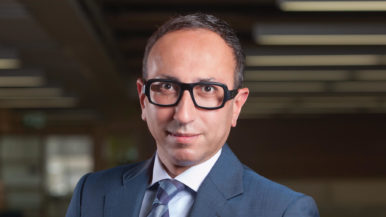“You can buy a house in the metaverse for $15,000”: This guy is the CEO of a company paying millions for virtual real estate

Lorne Sugarman is the CEO of the Metaverse Group, a Toronto-based virtual real estate company that buys, develops and leases parcels of land in the metaverse. It’s a pretty gnarly concept, but he says the metaverse is the future of everything and that the financial opportunities are huge. We asked him all about it.
Everyone has heard of the metaverse, but not everyone’s sure what it is. Help us out?
If Facebook and Google were Web 2.0, the metaverse is Web 3.0. It’s the next phase of the internet, in which users explore video game–like 3-D worlds with a self-created avatar. You can do it now on your computer or with a VR headset.
What does your avatar look like?
Right now it’s pretty basic but ideally jeans, sunglasses, a Bruce Springsteen concert T-shirt, Nike sneakers.

What’s the appeal of all this?
Escapism, forgetting what’s going on in your day-to-day. It’s social, it’s fun, and you can be whoever you want. And as the technology improves, the experiences are going to become more immersive.
How big is the metaverse?
There are a few worlds, but one of the biggest is Decentraland. It has 300,000 monthly users and several districts, including Vegas City, which will have casinos, nightclubs, theatres. Crypto Valley is where tech companies will have offices. In the Fashion District, clothing brands will sell merchandise for avatars. There are concerts, art shows and festivals, too.

You run the Toronto-based Metaverse Group. What’s the business model?
We want to be the Brookfield Properties of the virtual real estate world. We’re buying land, designing properties and renting them out. We just paid $2.5 million (U.S.) for 6,000 square feet of land in the Fashion District. We view this stage like the early days of European settlement in the U.S. Imagine you could buy property on Fifth Avenue back in the 1800s. Real estate in the metaverse will appreciate as more people and brands arrive.
To whom do you make out the cheque?
The land was bought from a third party. I can’t reveal any names.
How did you get into this field?
I got an MBA from Rotman in ’91, worked in investment banking, then led a health tech company. By 2021, I knew a little bit about the metaverse, but when the CEO of Tokens.com, our parent company, asked me to join, I researched more and realized the potential.
I gather Snoop Dogg bought a house in the metaverse and someone paid $450,000 (U.S.) to be his neighbour.
I know who bought it, but I can’t say who it is.

Can we agree that is a lot of money for something one can’t actually live in?
Sure, but we’re at the stage where you can sit in your bricks-and-mortar home wearing a VR headset and watch a movie in the metaverse. It’s also about the “cool factor”—gaining status by telling your friends you bought a house. And, of course, it’s a financial investment.
How expensive is a house in Decentraland?
For a standard home, between $15,000 and $50,000. If you’re near Snoop Dogg or in the Fashion District, it would be higher.
Your company has gone all in on this, with a multi-million investment in virtual real estate. What makes you so sure it won’t be the next Google Glass or Quibi?
Consumers are looking for more immersive experiences. I watch my 12-year-old son play Grand Theft Auto with his friends, or my 14-year-old daughter create NFT artwork. I used to be a competitive tennis player and I play ping-pong using my VR headset. Plus, we’ve seen a lot of buy-in from tech. Facebook, which owns the VR headset company Oculus, has rebranded to Meta and will further develop its 3-D world. Nike and Adidas are creating virtual clothing for avatars. This is the future of the internet.

How much time do you spend in the metaverse?
About an hour a day. Usually I explore Decentraland, seeing which areas are being developed.
Are you working from home now?
Yes, but we intend to have VR meetings at our Decentraland headquarters soon. We’re building it now. It’s a tall tower with a deck and infinity pool on the roof for parties and gatherings.
Another bonus: no Covid in the metaverse.
That’s right. A friend of mine who lives in Florida is, like me, a huge Springsteen fan. The last time we saw him was at Rogers Centre. Now we could watch him together, virtually, from wherever.
How long until we’re all listening to the Boss and holding meetings in the metaverse?
Maybe I’m overly optimistic, but comparing it to the growth of Facebook, I’d say a major portion of the population will be using this technology within 10 years.
—This interview was edited and condensed for clarity





